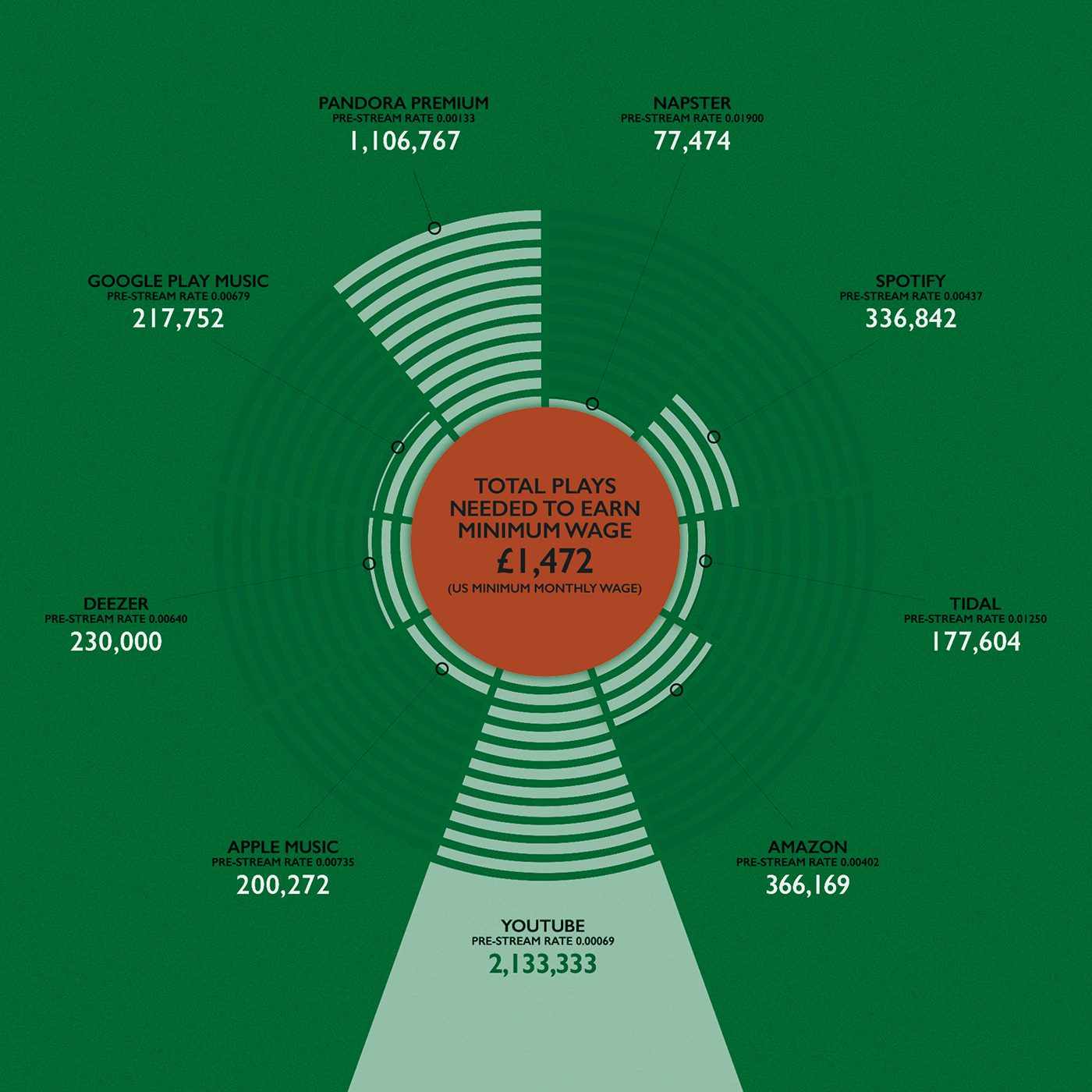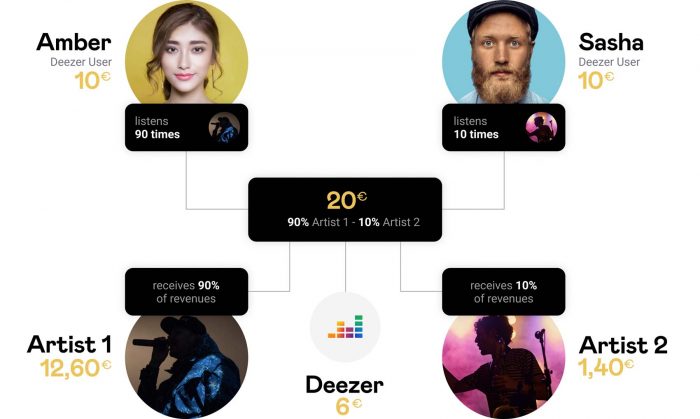Deezer Streaming Payout
The Curse of Music Streaming
What Streaming Services Pay Artists Music streaming services are notorious for not paying artists well. While most of the services don’t release official figures, information collected directly from musicians and other sources indicates that artists can expect to make anywhere from $0.00069 to $0.019 per stream.
As Deezer's worldwide share of music streaming subscribers is ten times smaller than Spotify’s, the company would need to break America in a big way to have a significant impact on the market. Launching several years ago in the US, French-based streaming music service Deezer still doesn’t have an established presence in the country. Back in 2018, at $0.0056, the service topped GPM in.
I’m an indie band loyalist. Forager of the unknown. Underground scene stalker. Like to think indie bands are my little secret. Bittersweet when they become mainstream but fine, happy for them anyway.
Deezer Music Streaming
And in all my years following indie bands, I’ve noticed something that doesn’t seem to add up.
Indie bands fill concert venues to the brim, their merchandise sell like crazy, and their songs stream non-stop. But despite years in the grind and with such huge followings, they’re still juggling multiple jobs and sleeping a few hours a night in time for their day jobs.
What Does Deezer Pay Per Stream
Meanwhile, on the other side of the world the kings and queens of pop and hip hop are making millions as top streamed artists. Artists who’ve never made it to my indie radar playlists nor to those of my friends’.
Point is, the stark realities amongst musicians make me think about how much streaming services pay artists through their labels and providers. How fair are they to listeners’ choices and the artists they support?
Let the music gods rain down on all of us.
Here’s the thing:
Between you and the artists you listen to, is a matrix of streams, algorithms and systems that decide where your music playing leads to. Did you think that the earnings from the music you play actually go to the artists you support? Chances are, you’re helping fund a pop star’s next tour.
Fact: Major streaming services do not actually pay artists based on how much of their music you stream as an individual, but on how much their music is streamed within the entire count of streams. Bringing us to the bottom line: your money may not go to the artists you enjoy.
Where is the fairness in all of this?
The starving artist is no romantic story.

There’s nothing romantic about it when you feel like writing music is like pushing against a wall. It’s a vicious cycle. You spend to make songs, your songs get streamed, you get nothing back from your streams, but you can’t stop creating music or you become irrelevant.
We like rags to riches stories when a happy ending makes us feel good. But for the vast majority of musicians, the daily grind becomes a lifelong grind. And for most of us, that happy ending never comes.
Am I cursed forever?
Maybe there is a way out of this vicious cycle. That I don’t have to tell my future kids and kids’ kids that pursuing music is pointless. But we can’t wait much longer or that musical divide will become a deep, dark chasm, a gap too distant to bridge.

If we start asking for more transparency and accountability now, we can spare ourselves that reality. There could be a better way of doing things with a user-centric payment system (UCPS), a fairer way to support the artists we listen to. It starts with everyone in the industry supporting UCPS : streaming platforms, labels, providers, artists, listeners. With UCPS we can change how music history is written.
A fair future
We all talk about supporting artists, valuing their craft, fair pay. When in truth, the system today is not built to support our choices and the artists we enjoy. We celebrate the victories of musicians who’ve made it, but forget about those who don’t benefit from the system’s bias. A bias that helps some but leaves others in a hole.
It wouldn’t be as bleak a picture if I were just an outsider looking in. But as an artist, I’ve seen so many musician friends pack up their gear and give up their careers, or work the oddest jobs to keep them going. Likewise for my band, despite thousands of followers and millions of streams, payouts from streaming is still hardly enough to fund our next song.
Don’t get me wrong – UCPS isn’t going to change our lives overnight. It’s one of many things that needs to be fixed in the music industry. But as a step in the direction of a fair future, a step towards lifting this curse, it’s one we should take.
The user centric payments system (UCPS) is an initiative kicked off by Deezer in 2017. A user centric payment model would restructure the current way of allocating royalties for music streaming. Today, royalties are allocated based on the overall market share on the platform. Under a user centric model, royalties would be allocated based directly on each listener’s streams, creating a fair environment for all artists and building a direct connection between fans and musicians. Support your choice of artists by supporting Deezer’s initiative for a UCPS pilot in 2021.
Related Posts
Switching to user-centric royalties may not lead to the fairer distribution of streaming wealth that many seek, says a major new study.
By Emmanuel Legrand from the Legrand Network
A new study into the impact of a music streaming User-Centric Payment System (UCPS) to remunerate rights holders concluded that a switch to the UCPS model rather than the current pro rata model, or Market Centric Payment System (MCPS), would not fundamentally result in massive shifts in revenues but could have some benefits for under-represented music genres in the current system.
Tandberg scsi & raid devices driver. With MCPS, all streams are put in a pool and then royalties are distributed to rights holders based on the level of the streams generated for each title on a streaming service, whereas with UCPS, royalty distribution is based on what each user consumes.
The study (in French), commissioned by French government-backed Centre National de la Musique (CNM) to Deloitte, does not make a final call on UCPS v. MCPS, but lists several benefits that could be linked to UCPS. It was based on data from Spotify and Deezer, as well as contributions from rights society SACEM and from major record labels and independent companies. Other music streaming services decline to participate in the project.
Inform the debate
CNM President Jean-Philippe Thiellay wrote in the foreword of the study that the CNM “did not set itself the task of pronouncing on the fair or equitable nature of one distribution method in relation to the other or to place itself in the field of moral and business strategy.” Instead, he said the aim of the study was to “measure the impact of the eventual switch from one model to another on the redistribution of royalties and thus inform the debate.”
One of the first tasks was to set up with stakeholders a “common impartial methodology” that would be executable by the participating streaming platforms based on the study of existing methodologies. The various parameters agreed to were the following: The entire music catalogue (specific to each platform, excluding podcast) will be included in the study to ensure an overall impact assessment; the time frame chosen was the calendar year 2019I; the geographical scope was restricted to users in France; and only paid subscribers were included in the study.
The study analysed the impact of each system in terms of distribution of royalties, musical diversity, recommendations and on the fight against fraud. The study also attempted to analyse the cost of switching from one model in a qualitative way, since quantitative and documented data could not be provided.
Benefit the genres with the weakest audiences
Deezer executed the common methodology from a full sample covering the year 2019 while Spotify chose to run its own methodology. The comparison between the two systems was based on a sample of 100,000 users provided by Spotify in the first half of 2019.
Moving to UCPS would erode revenues for the Top 10 most streamed artists and “could promote a redistribution of income for the benefit of artists, titles and genres with the weakest audiences, but, if the percentages of change seem not insignificant, the amounts in value remain in reality limited, as they stand,” according to the study.
Deezer data shows that the Top 10 most streamed artists could see an overall drop of 17.2% of their royalties and of 12.5% according to Spotify (see graph below).

With MCPS, the Top 10 attracts 9.3% of the royalties, while with UCPS, the number drops to 7.7%, suggesting that the UCPS would even the playing field in favour of lower tier artists. In fact the main beneficiary of the drop from the top are artists ranked between 101 and 1,000 (see graph below). For the lower tier of artists below 10,001, there is a limited increase from 7.7% with MCPS to 8.1% of the royalties with UCPS.
“The Top 10 artists are more strongly impacted,” with UCPS, with a drop of “several hundred thousand euros on average” for the artists affected, according to the study. For artists in the Top 11-100, the benefits could in the region of €9,000 per artist, and of €2,500 for artists in the Top 101-1,000 tier.
Low impact on least listened to artists

Beyond the Top 10,001 artists, additional royalties paid by artists to the entire pool of artists would be on average less than €10. “Switching to UCPS would therefore have a relative impact on the royalties generated for the least listened to artists,” reads the report.
In the analysis of the volume of royalties split by titles, based on Deezer figures, there are very little changes for the Top 100 titles (see below) with either system. In fact titles in the Top 101 to 100,000 would overall take a lower cut on royalties, while titles beyond 100,001 would account for 1.3 percentage point more of the overall pot of royalties.
However, switching to UCPS could promote “a significant redistribution between genres with large audiences,” to the detriment of rap and hip hop and in favour of rock and pop; switching to UCPS could also promote back catalogue’s market share (see below).
Telsey driver. The UCPS model would re-evaluate niche genres: classical (+ 24%), hard rock (+ 22%), blues (+ 18%) for example, but the financial impact (in value) “would be relative to their market share despite double-digit growth.”

Interestingly, based on Deezer figures, the share of revenues from the top 5 distributors would actually increase by 0.7% with UCPS, to the detriment of smaller distribution companies.
In addition, the study concludes that the UCPS model “would make it possible to reduce the impact of one of the most prevalent frauds which consists in creating a maximum of streams for targeted titles and artists.”
Ensuring sustainability
Switching to UCPS would come at a cost. The CNM suggests that the development of the UCPS model “should be primarily the responsibility of the platforms” and that “the financial burden of these costs could be shared among all the stakeholders in the sector.”
How Much Does Deezer Pay
CNM said more work needs to be done with stakeholders, and with the Ministry of Culture, on “the challenges and methods that would lead to a greater development of streaming in France, while ensuring the sustainability of the economic models of all stakeholders.”
“Yes, the UCPS represents a different model,” wrote Thiellay, “with measurable and positive consequences for the genres and artists less listened to today on streaming platforms. With this system, the subscription of certain music lovers would go to the artists they listen to, without taking into account the question of whether these artists also benefit from a significant overall listening rate.”
Not the place for better remuneration
He added: “However, it should be noted that, in the current state of the market for recorded music on streaming platforms, the impact of UCPS in terms of value is symbolic for most of the categories analysed. One figure is quite striking: beyond the 10,000th most listened to artist, all genres combined, the impact of the switch to user-centric would be at most a few euros per year on average over the year per artist.”
Thiellay said that overall, what the study shows is that neither system will really solve the issue of artists’ remuneration. “It is now clear: this is not where the fight for authors, composers and performers, asking for better remuneration for their work is going to take place today,” he wrote. For Thiellay, an area of change could be in the role of search engines and recommendation tips based on algorithms to make more room for diversity.
French performers’ collecting society ADAMI said the study was “an expected disappointment” but commended the CNM for undertaking the project “in a serious, objective and successful manner.” For ADAMI, the conclusion of the study is straightforward: “To the central question: does user centric improve the remuneration of artists? The answer is clearly no! If the user centric model makes it possible to smooth the remuneration of the top 10 towards other artists, in particular, those after the 10,000th rank, the effects in terms of value are notoriously insufficient, even nil.”
Sharing streaming value
ADAMI added: “The user-centric debate should not distract everyone from the essential one about sharing streaming value between all stakeholders. This question has divided the music industry for too long. It has become a global issue carried by artists of all notoriety and all nationalities. This topic therefore remains open and more relevant than ever. Artists expect strong responses from the government.”
How Much Does Deezer Pay Per Stream
For UPFI, the organization representing independent music companies in France, the study “constitutes a crucial step” in the discussion about music streaming models. “This study confirms that there is a strong case regarding the distribution of income according to repertoires, which is uneven depending on the model adopted,” said UPFI, adding that it will ensure that the “possible evolution of the current system preserves niche or more confidential genres, and promotes the persistence of our model of diversity.”
[Analysis: This study provides a very interesting contribution to the debate on remuneration from music streaming and how the money is split between the various stakeholders. More research needs to be done, and streaming services should be more willing to contribute (only Deezer and Spotify provided data for this study)
Some will be disappointed that it does not make a final determination on one system versus the other. However, what it shows it that UCPS is a fairer system, in that it allows more diverse genres to get a bigger slice of the pie.
However, it should not come as a disappointment that it does not answer the key question: how can more money flow into the system?
Indeed, whether it is UCPS or MCPS, what we are dealing with is a finite pot of money. What can change is how it is split, in particular how the songwriters and publishers’ pot can grow. Elsewhere in this publication, NMPA’s President and CEO David Israelite suggests that streaming services paying themselves 37.5% might be too high compared to the cut that other service providers take. That’s certainly something to look into but I doubt that the Spotify’s of this world will welcome a drop in their share of revenues.
The only way to increase the pot would be by a) ensuring that more consumers switch to a subscription rather than an ad-supported service; and b) by increasing the monthly subscription rates paid by consumers, which is something streaming services have refused to do so far.
This January, my Netflix subscription has increased, and what I am paying today is double what I paid when I joined some 10 years ago. That’s about right, isn’t it? The discussion should now focus on the only variable that can change, and how much consumers are ready to pay to access all the music in the world.
Charging each month the price of three lattes from your local Starbuck does not seem too high a price. Maybe it should be the price of four lattes.
